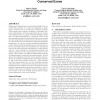Free Online Productivity Tools
i2Speak
i2Symbol
i2OCR
iTex2Img
iWeb2Print
iWeb2Shot
i2Type
iPdf2Split
iPdf2Merge
i2Bopomofo
i2Arabic
i2Style
i2Image
i2PDF
iLatex2Rtf
Sci2ools
151
Voted
RECOMB
2004
Springer
2004
Springer
Computational identification of evolutionarily conserved exons
Phylogenetic hidden Markov models (phylo-HMMs) have recently been proposed as a means for addressing a multispecies version of the ab initio gene prediction problem. These models allow sequence divergence, a phylogeny, patterns of substitution, and base composition all to be considered simultaneously, in a single unified probabilistic model. Here, we apply phylo-HMMs to a restricted version of the gene prediction problem in which individual exons are sought that are evolutionarily conserved across a diverse set of species. We discuss two new methods for improving prediction performance: (1) the use of context-dependent phylogenetic models, which capture phenomena such as a strong CpG effect in noncoding regions and a preference for synonymous rather than nonsynonymous substitutions in coding regions; and (2) a novel strategy for incorporating insertions and deletion (indels) into the state-transition structure of the model, which captures the different characteristic patterns of align...
Computational Biology | Gene Prediction Problem | General Terms Algorithms | Large Data Sets | RECOMB 2004 |
Related Content
| Added | 03 Dec 2009 |
| Updated | 03 Dec 2009 |
| Type | Conference |
| Year | 2004 |
| Where | RECOMB |
| Authors | Adam C. Siepel, David Haussler |
Comments (0)

